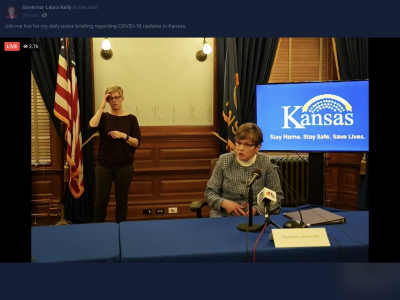Kelly sounds budget alarm: Kansas needs direct, flexible aid from federal government to avoid ‘very deep cuts’

Kansas Gov. Laura Kelly speaks at a COVID-19 briefing on Friday, April 24, 2020.
State budget experts earlier this week suggested Kansas will face a $1.37 billion shortfall over the next two fiscal years as a result of economic hardships caused by the COVID-19 pandemic.
As a result, Gov. Laura Kelly on Friday called on the federal government to make direct and flexible aid to states a priority in coming COVID-19-related stimulus packages. Without it, she said, Kansas will be forced to make sweeping cuts greater than those faced as a result of the Great Recession — all in a single budgeting cycle.
“I cannot overstate the severity of the budget crisis on the horizon to both the state and local units of government,” she said in her daily COVID-19 press briefing. “If the federal government fails to act, we will be forced to make very deep cuts to critical services.”
Though Congress passed a $2.2 trillion stimulus package known as the CARES Act in March, states are prohibited from using funds from that bill to replace lost general fund revenue. Without flexibility to spend federal aid in a state’s key areas, Kelly said, states won’t be able to pay their bills.
She also admonished federal officials for suggesting that states in dire financial need simply declare bankruptcy — a plan Senate Majority Leader Mitch McConnell, R-Kentucky, floated on Wednesday.
“I don’t even know what that means,” Kelly said.
“If we want to protect all the progress we’ve made in recent years in our schools, in our corrections systems, in our infrastructure and more, then Kansas will need help to get through this.”
Kansas on Friday reported another big jump in confirmed COVID-19 cases, finding 295 new cases and bringing the state’s cumulative total to 2,777. The state death toll actually fell from 112 to 111 after a patient who died was likely misdiagnosed as having the virus, Kelly and Kansas Department of Health and Environment Secretary Dr. Lee Norman said.
The number of total hospitalizations from the virus rose slightly, and there have now been 457 hospitalizations from COVID-19 out of 2,173 cases where data is available.
Norman said Friday that Kansas is now monitoring 52 clusters, or outbreaks, of the virus. Those can be traced to the following locations:
• 19 in long-term care facilities, resulting in 377 cases and 63 deaths;
• two group living arrangements, resulting in 28 cases and zero deaths;
• one at the correctional facility in Lansing, resulting in 82 cases and zero deaths;
• two in health care facilities, resulting in 16 cases and zero deaths;
• five from religious gatherings, resulting in 88 cases and eight deaths;
• 17 from private company gatherings, resulting in 99 cases and four deaths;
• six from meat-packing plants, resulting in 250 cases and zero deaths.
Though the state continues to register larger increases of total cases as it increases its testing capacity, Norman said he was cautiously optimistic that Kansas was at its peak of hospitalizations and deaths related to the respiratory virus.
“The conundrum is around the total number of cases that could go up, while the percent positives (are) going down,” he said.
The state to this point has tested 23,588 people for the virus, and the rate of Kansans testing positive is 11.7%.
Kelly said Friday that if the trends for lower hospitalizations and death rates continued to hold, Kansas should be able to proceed with its plan to gradually begin reopening the state. Kelly’s statewide stay-at-home order was extended from April 19 to May 3 and may be extended yet again.
“We feel optimistic Kansas is close to reaching its peak infection rate, if we haven’t already,” she said. “If that is accurate, then we are headed toward the downward slope of this journey.”
Next week, Kelly said three key efforts in Kansas will begin to move at once: formulating a plan related to the CARES Act package to get dollars into the state economy as soon as possible; detailing plans for a phased reopening of the state; and gathering plans to deal with the aforementioned state budget crisis.







